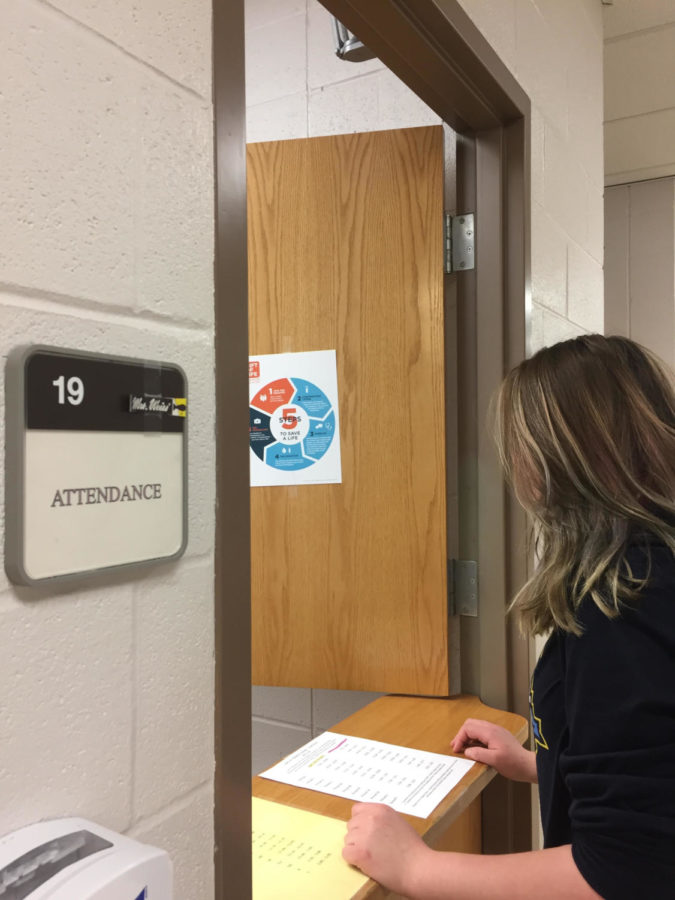“They hand out Saturday Schools here like candy”
May 3, 2018
It has been almost one year since the change in Solon High School’s (SHS) attendance policy which means all those early dismissals are finally starting to add up due to the change in how the missed school time is counted. In previous years, the time missed was accumulated in days, whereas now, it is hours. But what people may not know is that the policy itself has stayed relatively the same, it just appears to be more serious because of the fact that the hours encompass all time missed, including early dismissals, tardies, etc. which had not been included in the days. SHS Vice Principal Joshua Frazier said people don’t know this was a state-mandated change in policy.
“I know students and parents [think] ‘Oh, this is just the administration at Solon trying to give kids a hard time,’ and that’s not the case,” Frazier said.
In fact, House Bill 410 (HB 410) was passed by the Ohio General Assembly in 2016-it was only in the 2017-2018 school year that it started to be enforced. Ohio Department of Education staff member Brittany Miracle made it apparent that Ohio didn’t want to give students a hard time either.
“It is important for every student in Ohio to be in school every day,” Miracle said. “We know that when students miss too much school, they are less likely to read on grade level [by] third grade, less likely to graduate, and score lower on ACT [or] SAT than their peers who attended school regularly.”
HB 410 has had both positive and negative repercussions, but senior Michelle Kramarovsky said that she believes the school is having more issues because of the bill.
“I [say] they hand out Saturday Schools here like candy if you’re late because I went to one of my Saturday Schools and it was a full classroom,” Kramarovsky said. “And for almost all of [the people], it was because of their attendance.”
Kramarovsky also said that she believes attendance wasn’t as much of an issue before the change was made. Whether or not this is true, the saturday school punishment has remained unchanged, as SHS has been able to choose this punishment. The disciplinary actions themselves are decided upon by the school districts, but the time missed before a student receives one was determined by HB 410. So a school can implement whichever punishments they like, but they have no say in when the punishment must be given.
Additionally, Frazier amended that Saturday Schools were a Solon Schools decision and that the Bill only enforced the change from out-of-school suspension to community service, or something comparable, which Frazier said has actually been an improvement from the previous policy.
“In the past, school districts were allowed to suspend students for not coming to school,” Frazier said. “So for truancy, students would get suspended, and the state, and most of us felt that it was counterproductive to suspend a student who misses a lot of days… so that they could miss more days.”
This was not the only addition to make a positive change in the system. Frazier remarked on how helpful the new state-mandated intervention teams have been for students that are missing an abundant amount of school. These intervention teams consist of administrators that meet with parents and students to discuss why the student is missing so much school.
“Putting this bill into place is not going to decrease truancy,” Frazier said. “I think another approach is the attendance intervention teams. I think it’s bringing all of the players to the table to have conversations and try to really put interventions into place to help the student get to school.”
Junior Abigail Bednarski was diagnosed with an autoimmune disorder this year, causing her to be sick often. Because of this, she has missed 39 days of school and has had a fair amount of contact with the administration in order to get caught up on all her work.
“I haven’t had to meet with the intervention team,” Bednarski said. “I was just given what they call ‘home instruction’ for math to get caught up. I was able to meet with a tutor during my study hall or on the weekends at the library.”
Bednarski contacted the administration to ensure that she got the help she needed. It was this move that aided in her learning, but Frazier spoke of how some students don’t seem to give high school the same priority, when in reality, high school serves as the gateway to college and careers.
“I think that students need to make that connection that these policies are in place to prepare them for the real world and to give them what they need. You need to be in school.”
He went on to say that the immediate reward from a job may be behind the variations in motivation level, but he vehemently expressed that schooling, from high school to college, is how students get future careers.
“I think students don’t really view school as their job and they don’t have the same mindset and approach to school and attendance as they do to their job where they’re getting paid,” Frazier said. “And I think that’s the disconnect because I know some of my students who are always late here, but they hold a job, and I know that they are on time for that. And they follow the rules in regards to attendance at their job, but not at school.”
As it is now, both parties said that they believe the bill could use improvements. It was the first year and as Miracle put it, each school implements the policy at their own pace, and in their own way, and at this time it is impossible to tell what impact the changes have had overall.
“Districts have worked diligently this year to update systems and processes to ensure they are implementing the law as best as possible,” Miracle said. “We anticipate more thorough compliance next school year. Compliance with the law is important, but we also recognize that every district has unique strengths and challenges. Districts should apply HB 410 requirements through the lens of their community to support students’ needs.”












